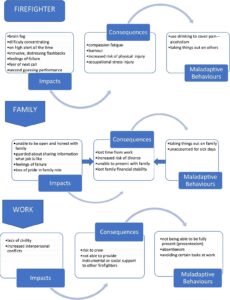Research Summaries
Why was the study done?
Firefighters are exposed to high rates of traumatic events. This exposure is linked to an increase in mental health disorders among firefighters. While all firefighters can experience these traumatic events, career firefighters also experience other occupational stressors, meaning different firefighters may have different needs.
This study explored the experiences of career firefighters and their perceptions of the impacts of mental health stressors on health, family and work. The researchers aimed to understand barriers or facilitators to maintain wellness and how research could help to improve health and wellness for all firefighters.
What was done in the study?
Firefighters from various ranks (frontline to chiefs) from across Canada were selected to participate in the study. In total, 39 firefighters (33 men, 6 women) participated in a semi-structured interview in-person or by phone.
What did we find out?
- There was a concern that, while the focus on posttraumatic stress disorder (PTSD) was positive, it was also limiting to focus on one diagnosis.
- Many participants acknowledged the “two-sided” nature of many coping mechanisms (e.g., dark humour) to support or hurt mental health.
- Impacts could be grouped into three categories personal, family, and work. As expressed in the researchers’ figure below, each impact had consequences and maladaptive behaviours.

- Many of the firefighters were aware of, and had positive comments about, programs already in place like peer support, resiliency training, CISM, suicide awareness programs, and PTSD prevention. However, the training was not universally available or provided to everyone in their fire services.
- Many felt it was essential to support firefighters’ physical and mental health.
- They identified several barriers to getting mental health support:
- Firefighters themselves: mental health issues hard to identify, resistant to asking for help, lack of skills to deal with mental health
- Firefighter culture: need to be stronger than everyone else, masculine-dominated environment.
- Firefighter leadership/management: lack of understanding of mental health, lack of adherence to prevention programs.
- Mental health supports were sometimes hard to access, poorly targeted, costly, and providers didn’t understand the nature of firefighter work.
- Most interviewees acknowledged that policies and procedures were improving, but in many services they were not adequate for firefighters’ needs.
- The firefighters also identified needs like increased training, better prevention and treatment, improved culture, family training, timely-unlimited therapy, better training on the claims system, and continued stigma reduction.
- Four areas for further research were identified:
- awareness and monitoring;
- understanding mental health;
- better prevention and treatment; and
- access to care.
Where do we go from here?
This study provides valuable insight into firefighters’ concerns and needs. It also shows that mental health services in the fire service are variable and depend on the individual fire service. It is vital to continue to expand our understanding of frontline impacts and needs. In expanding mental health understanding and available training and treatment, firefighters, management, mental health providers, and families must play a role.
The original wording of the study was changed and condensed for the current research summary.
Original Study
MacDermid, J.C., Lomotan, M., & Hu, M.A. (2021). Canadian career firefighters’ mental health impacts and priorities. International Journal of Environmental Research and Public Health, 18, 12666. https://doi.org/10.3390/ijerph182312666
Research summary prepared by Kossick, E. Edited and reviewed by Barootes, B., Lomotan, M & MacDermid, J.